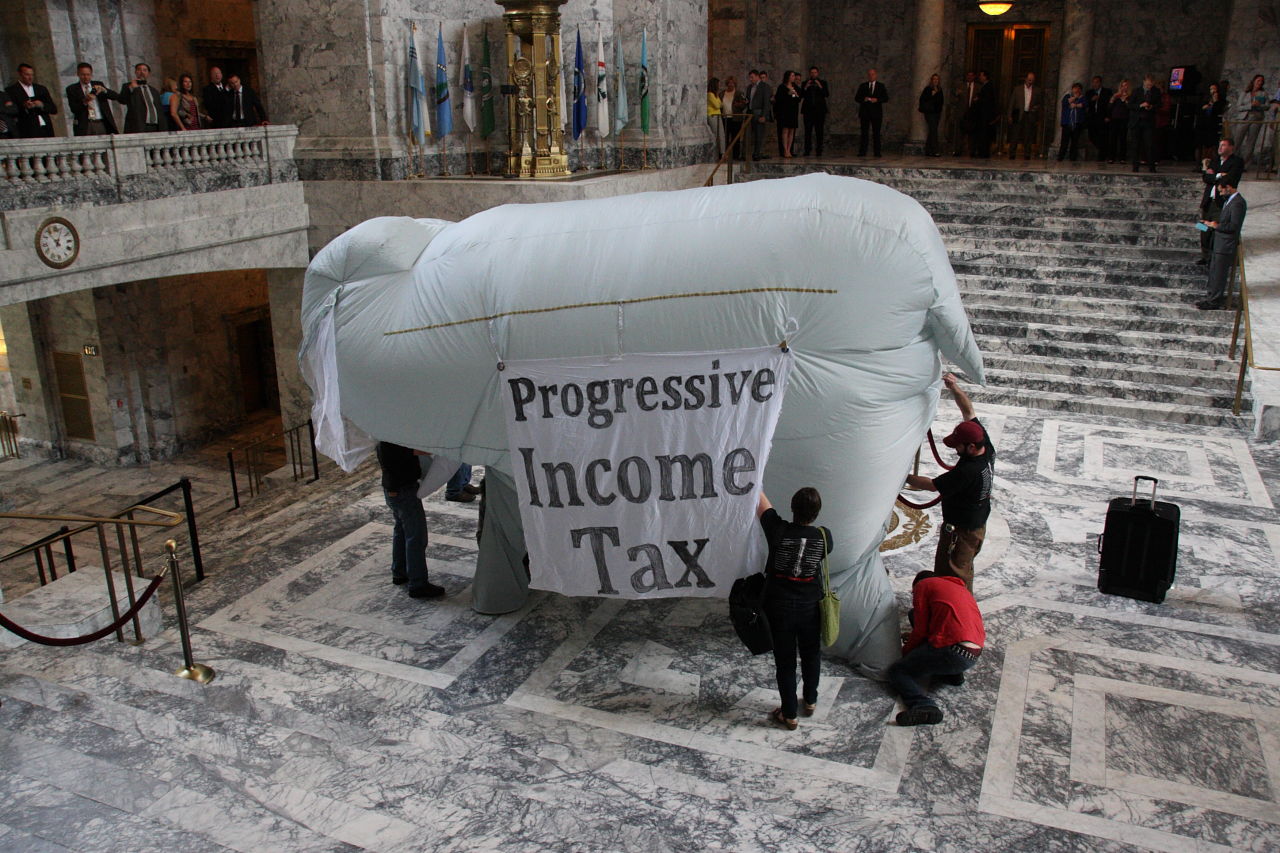Seattle’s City Council has voted unanimously to levy an income tax of 2.5 percent on high earners, setting the stage for a protracted legal battle over whether local governments have the authority to pursue progressive tax reform on their own.
Only income in excess of $250,000 would be subject to the tax, which would fund:
- reductions in property and business and occupation taxes
- solutions to our homelessness crisis
- investments in education, affordable housing, and transit
- projects that lose money due to federal budget cuts
- efforts to bring about a just and responsible transition to clean energy
Some proceeds would also be dedicated to administer and collect the tax. The proposal is scheduled to go into effect on January 1st, 2018.
The legal battle will be well underway before then. It will likely begin in King County Superior Court in the coming days, with an appeal being filed by the losing side to the Washington State Supreme Court. The battle is certain to draw a lot of interest; we expect a fair number of amicus briefs will be submitted at both stages.
Because income taxes are based on ability to pay, they are one of the most sensible types of revenue sources. Most states in the Union levy income taxes (whether on individuals, corporations, or both), including Washington’s eastern neighbor Idaho, which is among the most conservative states in the country.
Washington voters enacted an income tax by popular vote in the 1930s, but the Supreme Court ruled it could not be collected in a questionable decision that progressives have been wanting to overturn ever since. Republican Governor Dan Evans tried twice to amend the state Constitution in the 1970s to explicitly give the state the authority to levy an income tax, but voters wouldn’t go along.
Since Evans’ time, no governor or Legislature has made a serious attempt to overhaul the state’s upside down tax code. Having not seen any evidence that lawmakers are capable of working together to address the matter, voters across the state have responded skeptically when asked if they’d support an income tax.
A November 2010 initiative to levy an income tax on high earners, spearheaded by Bill Gates Sr., garnered less than 40% of the vote.
Research indicates there is plenty of support among the statewide electorate for an incremental tax reform approach emphasizing smaller steps, like:
- levying a capital gains excise tax
- closing tax breaks that are no longer in the public interest
- requiring corporations to repay tax breaks and subsidies they previously received if they fail to deliver on their job creation promises
- enacting a homestead exemption to make property taxes fairer
- repealing the loophole-ridden business and occupation tax on gross receipts and replacing it with a fairer solution
Were lawmakers to start implementing these ideas, it would increase public trust in government. More voters would become open to the idea of an income tax.
In Seattle, though, the enthusiasm already exists, even without legislative action. Seattleites are on record as being in strong support of an income tax. Numerous polls have found robust majorities in support of levying one, and Seattleites voted overwhelmingly to pass Initiative 1098 in 2010, as was pointed out by the staff running the city council’s Twitter account this afternoon.
Susan Hutchison and the state Republican Party are throwing a huge fit, calling the city’s ordinance unconstitutional and illegal. That’s amusing, considering all of the unconstitutional Tim Eyman initiatives they’ve enthusiastically endorsed over the years. The party knew Eyman’s I‑1366 was blatantly unconstitutional when it appeared on the 2015 ballot; they urged people to vote for it anyway.
It remains to be seen if the Seattle City Council’s action today will meaningfully advance the cause of progressive tax reform statewide. This ordinance may not yield a ruling overturning the holding of that badly reasoned Supreme Court decision from the 1930s. The Court could just rule that cities don’t have the authority to levy this kind of tax. They may choose not to reach the underlying issue. We’ll see.
But if nothing else, it’s nice to know that at least at the local level, we have elected representatives who are willing to be bold and creative in an effort to catalyze change. That’s what is needed in difficult, uncertain times such as these.

